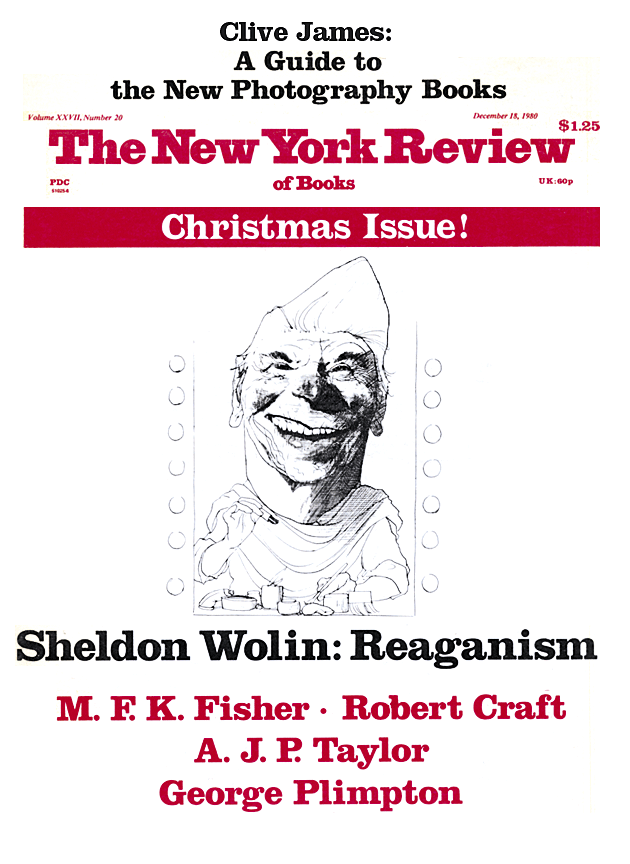In response to:
Life in the Therapeutic State from the June 12, 1980 issue
To the Editors:
I have found Christopher Lasch’s regular reviews in your journal to be penetrating, enlightening critiques of what are often superficial and facile attempts to generalize about the evolution of the modern family. Thus I was dismayed while reading his review of The Policing of Families [NYR, June 12] by Jacques Donzelot to find him empathizing with an overly simplistic view of the role of professional helpers (“the therapeutic state”) in society. Although he has made many valid criticisms of the intrusive, yet seductively helpful way in which they police families, his completely negative description of them unfairly distorts the issues that practitioners are faced with on the ground level.
To go straight for the head: what does Mr. Lasch feel is the appropriate response of social workers when they encounter parents, who are savagely beating or continually injuring their children? Do the children of these families require “a policy on officials, designed to keep them in their place”? Unquestionably, the therapeutic community has on many occasions overstepped itself, imposing middle class western values onto all types of families, acting as agents of social control. But they have also served a humanitarian function, which I regret that Mr. Lasch’s review neglected to mention.
Joshua Miller
Wandsworth Family Service Unit, London
Christopher Lasch replies:
I can sympathize with the mixture of indignation, compassion, and frustration that lies behind Mr. Miller’s question. Nevertheless I have to insist that even these children need a policy on officials. Indeed they need such a policy more than anyone else. Those most in need of help are most likely to lose sight of its limits and potential dangers.
The point is not that therapists have occasionally “overstepped” themselves. The point is not to check the excesses of a few over-enthusiastic cultural missionaries or to instill a greater sense of cultural relativism in the helping professions but to understand that even at their best—even at their most enlightened and judicious—those professions by their very nature serve as agents of social control (a subject to which I shall return) and, moreover, that they exercise their authority in a way that threatens the civil liberties of those they claim to help. Legal safeguards that were designed to check the state when it stood in a frankly adversarial relationship to the citizen are ineffective when the citizen deals with a therapeutic state.
The need for a policy that recognizes the dangers inherent in organized benevolence becomes even clearer when we consider the arguments used by professional helpers to justify their authority. Note the overheated language Mr. Miller uses—language that has long been the stock-in-trade of professional child-savers—in order to defend an open-ended extension of therapeutic jurisdiction over family life. Not content to evoke the already loaded image of parents who “savagely beat” their children, he cites the further case of parents who are “continually injuring their children.” As we know from much experience, vague and undefined notions of “injury” and “neglect” have been indefinitely expanded to include almost anything an investigator finds morally offensive or contrary to current social usage. In some cases, courts have transferred children from their parents to state custody simply because their mother was living with a man to whom she was not legally married. This has been done on the grounds that her sexual “promiscuity” inflicted irreparable psychic damage on the child.
The first requirement of a policy on officials—designed to keep them in their place—is to specify a precise and restrictive definition of such previously inflatable categories as parental neglect, abuse, and indifference. Hortatory statements by social workers about the need for cultural pluralism are no longer enough.
The authority exercised by the “helping professions” over the family has to be seen as part of a larger development—the emergence (over a long period of time) of a new style of social control, which substitutes surveillance—the systematic observation of symptomatic data—for corporal punishment and other forms of physical coercion. The problem of social control can’t be seen simply as the “imposition of middle-class values” on the rest of the population. This is a simplistic notion of social control, which ignores the extent to which control in our society is exercised not in the name of an outworn middle-class morality but in the name of value-free social science. It is simplistic also in supposing that social work can be anything other than a form of social control. Social control is not a dirty word in its own right. No society can get along without controls. But some types of controls are clearly preferable to others. The problem we face today is to understand how our particular system of therapeutic controls operates, and to decide whether it is compatible with democratic institutions. If it isn’t, we ought to get rid of it.
This Issue
December 18, 1980


